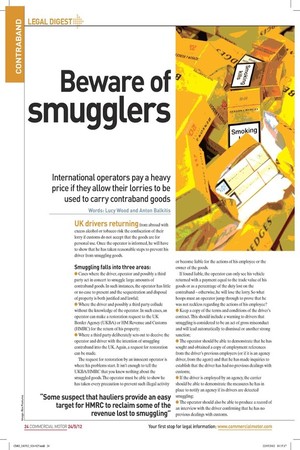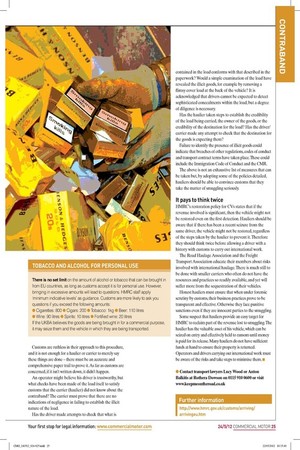Beware of
Page 16

Page 17

If you've noticed an error in this article please click here to report it so we can fix it.
smugglers
International operators pay a heavy price if they allow their lorries to be used to carry contraband goods
Words: Lucy Wood and Anton Balkitis UK drivers returning from abroad with excess alcohol or tobacco risk the confiscation of their lorry if customs do not accept that the goods are for personal use. Once the operator is informed, he will have to show that he has taken reasonable steps to prevent his driver from smuggling goods.
Smuggling falls into three areas:
• Cases where the driver, operator and possibly a third party act in concert to smuggle large amounts of contraband goods. In such instances, the operator has little or no case to present and the sequestration and disposal of property is both justified and lawful; • Where the driver and possibly a third party collude without the knowledge of the operator. In such cases, an operator can make a restoration request to the UK Border Agency (UKBA) or HM Revenue and Customs (HMRC) for the return of his property; • Where a third party deliberately sets out to deceive the operator and driver with the intention of smuggling contraband into the UK. Again, a request for restoration can be made.
The request for restoration by an innocent operator is where his problems start. It isn’t enough to tell the UKBA/HMRC that you knew nothing about the smuggled goods. The operator must be able to show he has taken every precaution to prevent such illegal activity or become liable for the actions of his employee or the owner of the goods.
If found liable, the operator can only see his vehicle returned with a payment equal to the trade value of his goods or as a percentage of the duty lost on the contraband – otherwise, he will lose the lorry. So what hoops must an operator jump through to prove that he was not reckless regarding the actions of his employee?
• Keep a copy of the terms and conditions of the driver’s contract. This should include a warning to drivers that smuggling is considered to be an act of gross misconduct and will lead automatically to dismissal or another strong sanction; • The operator should be able to demonstrate that he has sought and obtained a copy of employment references from the driver’s previous employers (or if it is an agency driver, from the agent) and that he has made inquiries to establish that the driver has had no previous dealings with customs; • If the driver is employed by an agency, the carrier should be able to demonstrate the measures he has in place to notify an agency if its drivers are detected smuggling; • The operator should also be able to produce a record of an interview with the driver confirming that he has no previous dealings with customs. Customs are ruthless in their approach to this procedure, and it is not enough for a haulier or carrier to merely say these things are done – there must be an accurate and comprehensive paper trail to prove it. As far as customs are concerned, if it isn’t written down, it didn’t happen.
An operator might believe his driver is trustworthy, but what checks have been made of the load itself to satisfy customs that the carrier (haulier) did not know about the contraband? The carrier must prove that there are no indications of negligence in failing to establish the illicit nature of the load.
Has the driver made attempts to check that what is contained in the load conforms with that described in the paperwork? Would a simple examination of the load have revealed the illicit goods, for example by removing a flimsy cover load at the back of the vehicle? It is acknowledged that drivers cannot be expected to detect sophisticated concealments within the load, but a degree of diligence is necessary.
Has the haulier taken steps to establish the credibility of the load being carried, the owner of the goods, or the credibility of the destination for the load? Has the driver/ carrier made any attempt to check that the destination for the goods is expecting them?
Failure to identify the presence of illicit goods could indicate that breaches of other regulations, codes of conduct and transport contract terms have taken place. These could include the Immigration Code of Conduct and the CMR.
The above is not an exhaustive list of measures that can be taken but, by adopting some of the policies detailed, hauliers should be able to convince customs that they take the matter of smuggling seriously.
It pays to think twice
HMRC’s restoration policy for CVs states that if the revenue involved is significant, then the vehicle might not be restored even on the first detection. Hauliers should be aware that if there has been a recent seizure from the same driver, the vehicle might not be restored, regardless of the steps taken by the haulier to prevent it. Therefore they should think twice before allowing a driver with a history with customs to carry out international work.
The Road Haulage Association and the Freight Transport Association educate their members about risks involved with international haulage. There is much still to be done with smaller carriers who often do not have the resources and practices so readily available, and yet will suffer more from the sequestration of their vehicles.
Honest hauliers must ensure that when under forensic scrutiny by customs, their business practices prove to be transparent and effective. Otherwise they face punitive sanctions even if they are innocent parties to the smuggling.
Some suspect that hauliers provide an easy target for HMRC to reclaim part of the revenue lost to smuggling. The haulier has the valuable asset of his vehicle, which can be seized on entry and effectively held to ransom until money is paid for its release. Many hauliers do not have sufficient funds at hand to ensure their property is returned. Operators and drivers carrying out international work must be aware of the risks and take steps to minimise them. n • Contact transport lawyers Lucy Wood or Anton Balkitis at Rothera Dowson on 0115 910 0600 or visit www.keepmeontheroad.co.uk
Further information
http://www.hmrc.gov.uk/customs/arriving/ arrivingeu.htm










































